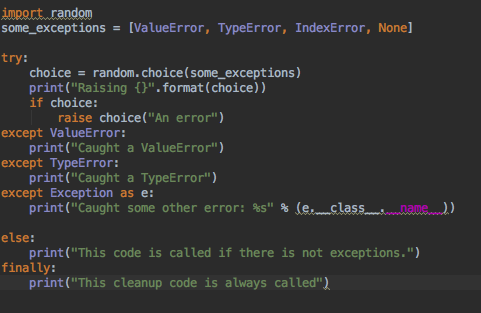报错 1 2 3 4 5 6 7 8 9 10 11 12 13 14 15 16 17 18 19 20 21 22 23 24 25 26 27 28 29 30 31 32 33 34 35 36 37 38 def chufa (a,b ):try : return retexcept Exception as e:print (e)print ("出错了" )else : finally : 5 ,0 )print (ret)def add (a, b ):if type (a)!=int or type (b) != int :raise TypeError("我这里只要int, 不要别的类型" )return a + b123 , "abc"
自定义异常返回 1 2 3 4 5 6 7 8 9 10 11 12 13 14 15 16 17 18 19 20 21 22 23 24 25 26 27 28 29 class GenderError (Exception ):pass class Person :def __init__ (self,name,gender ):def xi (per ):if per.gender != '男' :raise GenderError("这里是男澡堂" )else :print ("进去了" )'tudou' ,"不详" )'mantou' ,'男' )import traceback try :except GenderError as g:print (g)print (val)
类的约束 约束是对子类进行的约束。
在父类中给出一个方法。 这个方法中什么都不写。 就抛异常。 NotImplementError()
在子类中把上述的方法进行重写。
在子类中把上述的方法进行重写。
python中有两种办法来解决这样的问题.
提取父类. 然后在父类中定义好方法. 在这个方法中什么都不用干. 就抛一个异常就可以了. 这样所有的子类都必须重写这个方法. 否则. 访问的时候就会报错.
1 2 3 4 5 6 7 8 9 10 11 12 13 14 15 16 17 18 19 20 21 22 23 24 25 26 27 28 29 30 31 32 33 34 35 36 37 class Base :def login (self ):raise NotImplementedError("没有实现login方法" ) def kantie (self ):raise Gk("没有看帖功能" )class Normal (Base ):def login (self ):print ("普通人登录" )class Menber (Base ):def l (self ):print ("吧务登录" )class Admin (Base ):def login (self ):print ("管理员登录" )def login (obj ):print ("产生验证码" )print ("进入主页" )
使⽤用元类来描述父类. 在元类中给出一个抽象方法. 这样子类就不得不给出抽象方法的具体实现. 也可以起到约束的效果.
python中编写⼀一个抽象类比较⿇麻烦. 需要引入abc模块中的ABCMeta和
1 2 3 4 5 6 7 8 9 10 11 12 13 14 15 16 17 18 19 20 21 22 23 24 25 26 27 28 29 30 31 32 33 34 35 36 37 from abc import ABCMeta,abstractmethodclass Base (metaclass=ABCMeta): @abstractmethod def login (self ):pass class Normal (Base ):def login (self ):print ("::普通人登陆" )class Member (Base ):def login (self ):print ("::吧务登陆" )class Admin (Base ):def login (self ):print ("::管理员登陆" )def login (obj ):print ("1.产生验证码" )print ("3.进入主页" )
总结: 约束. 其实就是⽗类对⼦类进行约束. 子类必须要写xxx方法. 在python中约束的
方式和方法有两种:
使用抽象类和抽象方法, 由于该方案来源是java和c#. 所以使用频率还是很少的
使用人为抛出异常的方案. 并且尽量量抛出的是NotImplementError. 这样比较专业, 而且错误比较明确.(推荐)
异常类型 1 2 3 4 5 6 7 8 9 10 11 12 13 14 15 AttributeError 试图访问一个对象没有的树形,比如foo.x,但是foo没有属性x5 ]
Exception 万能异常
异常处理 1 2 3 4 5 6 7 8 9 10 11 12 13 14 15 16 17 18 19 20 21 22 23 24 25 26 27 28 29 30 31 32 33 34 def chu (a, b ):return a/b10 , 0 )print (ret)def chu (a, b ):return a/btry :10 , 0 )print (ret)except Exception as e:print ("除数不不能是0" )0 try :print ("各种操作...." )except ZeroDivisionError as e:print ("除数不不能是0" )except FileNotFoundError as e:print ("⽂文件不不存在" )except Exception as e:print ("其他错误" )
MD5
MD5是一种不可逆的加密算法. 它是可靠的. 并且安全的. 在python中我们不需要手写
1 2 3 4 5 6 7 8 9 10 11 12 13 14 15 16 17 18 19 20 21 22 23 24 25 26 27 28 29 30 31 32 33 34 35 36 import hashlib"root" .encode("utf-8" )) print (val)import hashlibdef my_md5 (yal ):"utf-8" ))return valinput ("name" )input ("passwd" )if name == "man" and my_md5(passwd) == "63a9f0ea7bb98050796b649e85481845" :print ('go' )else :print ("n" )
使用实例
1 2 3 4 5 6 7 8 9 10 11 12 13 14 15 16 17 18 19 20 21 22 23 24 25 26 27 28 29 30 31 32 33 34 35 36 37 38 39 40 41 42 43 44 45 46 47 48 49 50 51 52 53 54 55 56 57 58 59 60 61 62 63 64 65 66 67 68 69 70 import hashlibimport osimport sysimport hashlibdef md5sum (obj ):hash = hashlib.md5()hash .update(obj.encode('utf-8' ))return hash .hexdigest()def GetStrMd5 (src ):print (m0.hexdigest())pass def GetFileMd5 (filename ):if not os.path.isfile(filename):return open (filename, 'rb' )while True :8096 )if not b:break return myhash.hexdigest()def CalcSha1 (filepath ):with open (filepath, 'rb' ) as f:hash = sha1obj.hexdigest()print (hash )return hash def CalcMD5 (filepath ):with open (filepath, 'rb' ) as f:hash = md5obj.hexdigest()print (hash )return hash if __name__ == "__main__" :if len (sys.argv) == 2 :1 ]if not os.path.exists(hashfile):if not os.path.exists(hashfile):print ("cannot found file" )else :else :else :print ("no filename" )
日志处理
导入logging模块.
简单配置⼀一下logging
出现异常的时候(except). 向⽇日志⾥里里写错误信息.
1 2 3 4 5 6 7 8 9 10 11 12 13 14 15 16 17 18 19 20 21 22 23 24 25 26 27 28 29 30 31 32 33 34 35 36 37 38 39 40 41 42 43 44 45 46 47 48 49 50 import logging'app.log' ,format ='%(asctime)s - %(name)s - %(levelname)s - %(module)s: %(message)s' ,'%Y-%m-%d %H:%M:%S' ,40 ) import tracebackfor i in range (20 ):try :if i % 3 == 0 :raise FileNotFoundError("我是FileNotFountException" )elif i % 3 == 1 :raise StopIteration()elif i % 3 == 2 :raise KeyError()except FileNotFoundError as e:except StopIteration as e:except KeyError as e:except Exception as e:
多文件日志处理 1 2 3 4 5 6 7 8 9 10 11 12 13 14 15 16 17 18 19 20 21 'l1.log' , 'a' , encoding='utf-8' )"%(asctime)s - %(name)s - %(levelname)s -%(module)s: %(message)s" ))'A' , level=40 )'我是A系统' )'l2.log' , 'a' , encoding='utf-8' )"%(asctime)s - %(name)s -%(levelname)s -%(module)s: %(message)s" ))'B' , level=40 )'我是B系统' )
